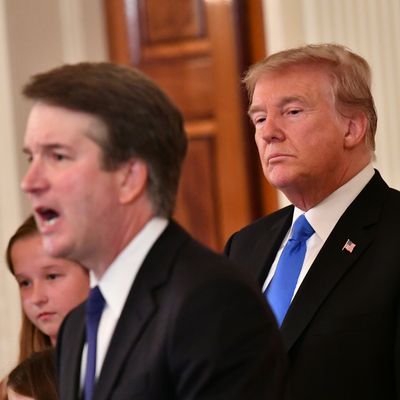
When trying to guess our current president’s next move, there’s one question that should always be considered: What’s in it for Donald Trump?
Any of the names on President Trump’s Federalist Society–approved list of potential Supreme Court nominees would have earned him effusive praise from the right and possibly a boost heading into the midterms. But there was only person on the list who clearly might be able to help Trump out if his personal legal predicaments wind up before the Supreme Court — and in a funny coincidence, Brett Kavanaugh wound up being the nominee!
Or, as CNN’s Jim Acosta suggests, maybe it’s no accident that Trump went with the judge who’s argued “we should not burden a sitting president with civil suits, criminal investigations, or criminal prosecutions.”
It took Kavanaugh several years to come around to the idea that the president is above the law — specifically, the time between when he assisted independent counsel Kenneth Starr in his investigation of Democratic President Bill Clinton, and when he worked as a White House lawyer and staff secretary under Republican President George W. Bush.
After clerking for Justice Anthony Kennedy, whom he now hopes to replace, and several other judges, in 1994 Kavanaugh was hired by Starr and tasked with investigating the death of Clinton’s deputy counsel, Vincent Foster. Contrary to many persistent conspiracy theories, Kavanaugh concluded that Foster’s death was a suicide, not a murder somehow involving the Clintons.
When Starr moved on to Clinton’s relationship with Monica Lewinsky, Kavanaugh urged his boss not to go easy on the president during questioning. According to records cited in Ken Gormley’s book The Death of American Virtue: Clinton vs. Starr, Kavanaugh wrote that Clinton “has disgraced his Office, the legal system, and the American people by having sex with a 22-year-old intern and turning her life into a shambles — callous and disgusting behavior that has somehow gotten lost in the shuffle. He has committed perjury. … He has tried to disgrace … this Office with a sustained propaganda campaign that would make Nixon blush.”
Kavanaugh also suggested very graphic questions for Clinton:
However, according to Shadow by Bob Woodward, Kavanaugh later objected to including sexually explicit details in the Starr report (but was overruled).
“The narrative shows how pathetic Clinton is,” Kavanaugh said. “That he needs therapy, not removal. It’s a sad story. Our job is not to get Clinton out. It is just to give information.”
As those pushing Trump to go with another Supreme Court nominee noted in recent days, Kavanaugh once argued in favor of a broad definition of presidential obstruction of justice. Kavanaugh authored parts of the Starr report that laid out potential grounds for impeachment, including misleading the public and turning his press secretary and other White House officials into “unwitting agents of the president’s deception.”
That kind of thing happens every day in the Trump administration, but a few years later Kavanaugh decided he was too harsh on the president. In 2009, he wrote in the Minnesota Law Review that Congress should pass a law making the president exempt from criminal prosecution and investigation while in office. He explained that while working for President Bush he came to appreciate “how complex and difficult that job is,” and concluded that the president should not be burdened with such distractions. “I believe that the president should be excused from some of the burdens of ordinary citizenship while serving in office,” he said.
Later Kavanaugh clarified that the president should only be above the law while in office:
If the President does something dastardly, the impeachment process is available. No single prosecutor, judge, or jury should be able to accomplish what the Constitution assigns to the Congress. Moreover, an impeached and removed President is still subject to criminal prosecution afterwards.
In general, Kavanaugh has a broad take on Executive branch power, and these views will certainly come up during his confirmation hearing. For now most Democrats are focused on highlighting the threat he poses to health care and reproductive rights, but Senator Cory Booker argued that his nomination is a constitutional crisis in the making.






























